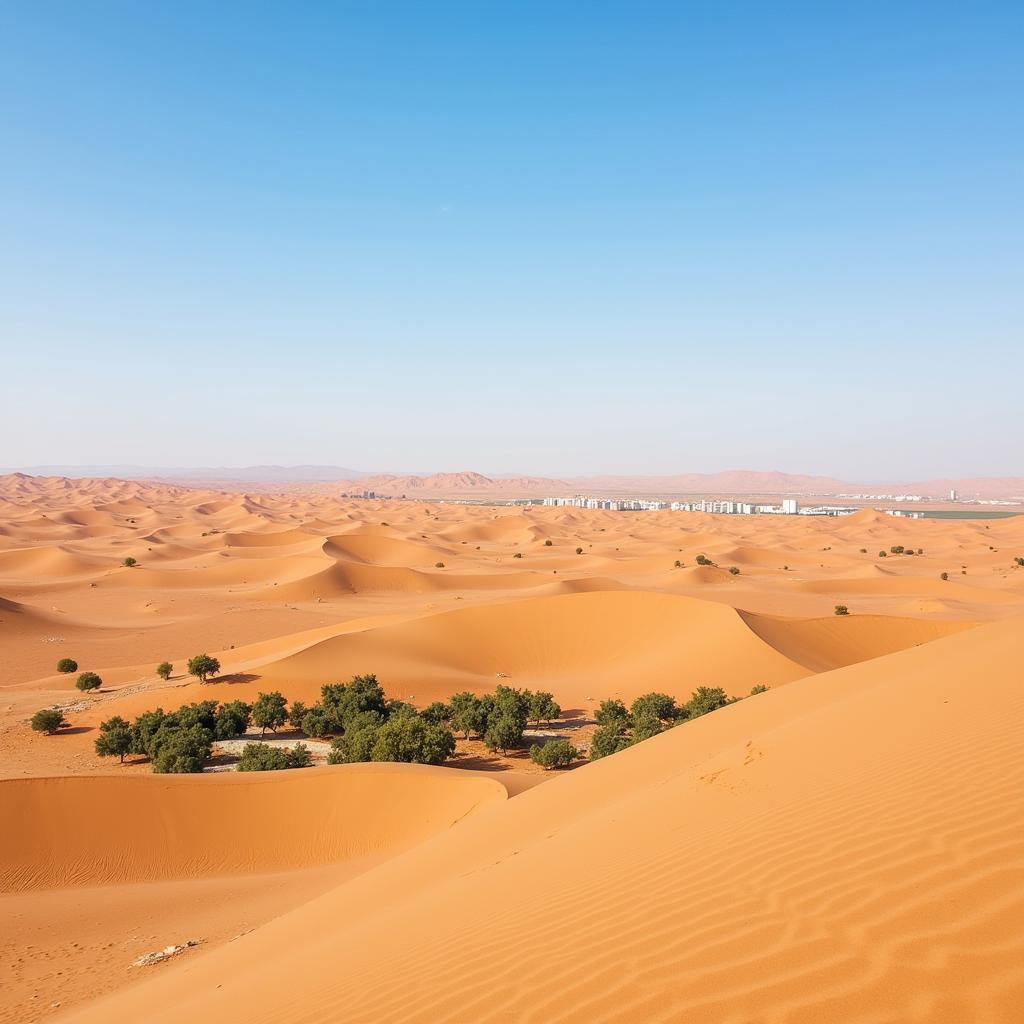Pakistan, a land of diverse landscapes, is also home to some of the world’s most fascinating deserts. These arid expanses, the Main Deserts Of Pakistan, play a significant role in the country’s geography, environment, and even culture. From the vast Thar Desert to the smaller, specialized deserts, each holds a unique story and offers a glimpse into the resilience of life in extreme conditions.
Unveiling the Secrets of the Thar Desert
The Thar Desert, also known as the Great Indian Desert, is undoubtedly the most iconic of the main deserts of Pakistan. Stretching across a significant portion of eastern Sindh and spilling over into India, this massive sandy landscape is characterized by shifting sand dunes, extreme temperatures, and a surprising array of plant and animal life.  Vast expanse of the Thar Desert with sand dunes and sparse vegetation What makes the Thar so captivating? It’s the juxtaposition of harshness and beauty, the way life adapts to the challenging conditions, and the rich cultural heritage of the people who call it home.
Vast expanse of the Thar Desert with sand dunes and sparse vegetation What makes the Thar so captivating? It’s the juxtaposition of harshness and beauty, the way life adapts to the challenging conditions, and the rich cultural heritage of the people who call it home.
Life in the Thar: A Story of Adaptation
Despite the harsh conditions, the Thar Desert supports a variety of life forms. Plants like the drought-resistant Prosopis cineraria and the hardy Salvadora persica provide sustenance for animals like the chinkara gazelle, the desert fox, and the endangered blackbuck. The people of the Thar, predominantly nomadic pastoralists, have also adapted to the desert’s rhythms, migrating with their livestock in search of water and grazing lands. They possess a deep understanding of the desert ecosystem and have developed sustainable practices for survival.
Beyond the Thar: Other Notable Deserts of Pakistan
While the Thar Desert dominates the landscape, Pakistan boasts other unique desert ecosystems. The Cholistan Desert, located in the Punjab province, is known for its arid plains and rich history. It is home to the Cholistan Desert Jeep Rally, an annual event that draws adventure enthusiasts from across the country. Then there’s the Thal Desert, also in Punjab, a smaller desert region known for its unique flora and fauna. Even Balochistan, often associated with rugged mountains, has its share of desert landscapes, with the Kharan Desert being a prime example.
Which Province of Pakistan Has No Desert?
Interestingly, not all provinces of Pakistan have deserts. Khyber Pakhtunkhwa, known for its mountainous terrain and lush valleys, is the only province without a significant desert region. which province of pakistan has no desert This highlights the geographical diversity of Pakistan, showcasing a spectrum of landscapes within a single nation.
The Impact of Deserts on Pakistan’s Environment
The main deserts of Pakistan play a crucial role in the country’s environmental balance. They act as carbon sinks, absorbing carbon dioxide from the atmosphere. They also influence weather patterns and play a vital role in groundwater recharge. However, desertification, the process by which fertile land transforms into desert, is a growing concern. dragon fruit plant in pakistan Understanding the delicate balance of these ecosystems is crucial for sustainable development and conservation efforts.
Protecting Pakistan’s Desert Ecosystems
Conservation efforts are underway to protect the unique biodiversity and cultural heritage of the main deserts of Pakistan. These efforts focus on sustainable land management practices, promoting eco-tourism, and empowering local communities. the environment of pakistan pdf Preserving these fragile ecosystems is not just about protecting the environment; it’s about safeguarding a vital part of Pakistan’s identity.
Conclusion: The Enduring Allure of Pakistan’s Deserts
The main deserts of Pakistan, with their stark beauty and unique ecosystems, offer a compelling glimpse into the power of nature and the resilience of life. From the vast expanse of the Thar to the smaller, specialized deserts, these arid landscapes hold a special place in Pakistan’s natural and cultural heritage. Understanding and protecting these ecosystems is vital for the future of the country.
Expert Insights:
- Dr. Ayesha Khan, Environmental Scientist: “The deserts of Pakistan are a treasure trove of biodiversity. They are home to species that have adapted to survive in some of the harshest conditions on Earth. Protecting these ecosystems is crucial for preserving this unique biodiversity.”
- Mr. Farhan Ali, Desert Ecologist: “The traditional knowledge of the desert communities is invaluable for conservation efforts. Their sustainable practices offer valuable lessons for living in harmony with nature.”
Need help? Contact us at Phone: +923337849799, Email: news.pakit@gmail.com or visit our office at Dera Ghazi Khan Rd, Rakhni, Barkhan, Balochistan, Pakistan. Our customer service team is available 24/7.